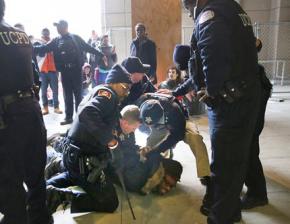Protesting health care apartheid at U of C
reports on the fight for quality health care for Black residents in Chicago.
THE CAMPAIGN to bring a Level 1 trauma center back to the University of Chicago Medical Center (UCMC) took a step forward on May 28, when UCMC Dean Kenneth Polonsky finally held a public meeting to discuss a South Side trauma center.
Three months ago, the university's private police force assaulted protesters who were staging a sit-in at the new campus hospital, the Center for Care and Discovery. The center opened with $700 million in state-of-the-art facilities, but didn't reopen a trauma center. This meeting represents the first time Polonsky, who has the power to act on activists' demands, has agreed to meet with protesters.
The University of Chicago has figured out that it can't violently repress protest--that tactic backfired and only helped the movement grow. More than 350 students, workers and community members packed a campus auditorium for the lunchtime meeting to show support for a desperately needed South Side trauma center.
After years of excuses, the university has finally admitted how critically needed a trauma care center is. Dr. Dorian Miller, who also spoke at the meeting, said a Level 1 trauma center "is a societal need."

But in the next breath, Polonsky made it clear that even though the university understands that many lives could be saved by opening a trauma center, UCMC has absolutely no intention of opening one. "If a Level 1 trauma center is going to be provided," Polonsky said, "it's going to have to be at another hospital."
The University of Chicago, with a more than $6 billion endowment, has more than enough money to open a trauma center in its hospital. Whatever Polonsky might say, the real reason UCMC won't reopen the trauma center is that it would serve poor, Black, South Side residents, most of whom cannot afford to pay and often lack health insurance, and the University of Chicago thinks their lives are expendable.
Activists had to interrupt the meeting for this point to be heard. "The deaths that we're talking about are Black deaths," said one attendee. "If white people were dying at the rate that Black people die, this hospital would have had a trauma center a long time ago!"
Polonsky claims that the decision of where to open a trauma center "should be a societal decision." Trying to absolve the University of responsibility for the poor, Black Chicagoans who are dying on the UCMC's doorsteps, Polonsky said, "This should be a public health problem."
It's yet another example of hypocrisy from University of Chicago officials, who claims South Side residents aren't its concern, yet maintains the one of the world's largest private police forces to help the Chicago Police Department terrorize and harass Black communities.
The University certainly doesn't mind stealing tax increment financing, or TIF, money from South Side schools. And when it comes to gentrifying larger and larger swaths of land around the campus, the university takes the lead in pushing poor Black residents out of their homes.
The University of Chicago not only doesn't care about Black South Side residents; it seems intent on pushing them out of the neighborhood altogether.
But the progress the campaign for the trauma center has made in the last few months point the way forward. By continuing to build a broad base of support among students, community members and health care workers, we can pressure the university from every angle.
We commit our struggle not only to fixing a public health crisis, but also to fighting the vicious racism in our city that creates that crisis.


